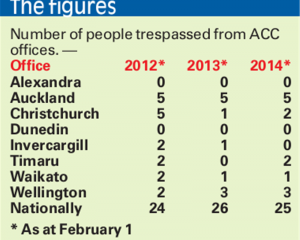Those affected parties are not restricted to people receiving compensation payments from ACC.
When the Government hiked levies, employers were up in arms at having to pay increased fees to avoid a so-called crisis in the part of the scheme called the tail, where long-term claimants are placed. When announcements of levy cuts are made, those in ACC action groups, such as ACC Futures lobby spokeswoman Hazel Armstrong, says levy cuts are only possible due to the hard line that ACC has taken on keeping compensation payments to an absolute minimum.
This week, ACC chairwoman Paula Rebstock announced ACC was recommending broad cuts to levies, including reducing rates for employers and self-employed people by 17%. ACC is also proposing a 15% cut for the earners levy, paid by all employees and which covers workers who are injured outside work.
Across-the-board cuts of at least 5% for car owners are in the mix, after ACC originally proposed cutting fees only for owners of cars meeting certain safety standards. But feedback called for all car owners to benefit from the improved position of ACC's motor vehicle account, so the cuts will be across the board. There is a catch, however. Owners of cars with higher safety ratings will get the largest savings. The top-rated, newest cars are expected to pay less with older cars lacking airbags and other features receiving less of a discount. Criticism has already come for those proposals, with opponents saying those least able to afford the newest cars will receive the least discount.
Ms Rebstock says the levy cuts are made possible by ACC's improved financial position, which mean the scheme is on track to be fully funded - with enough assets to meet its liabilities - by 2019.
In October, there was outrage over ACC's ''obscene'' surplus of $4.9 billion. Claimants said then the surplus was ridiculous given how difficult ACC had made it to obtain compensation.
The surplus was $3.6 billion ahead of budget and allowed the corporation to reduce the deficit between its assets and lifetime cost of every claim on its books from $7.2 billion to $2.3 billion. The corporation was undoubtedly helped by strong showings by financial markets. Along with the New Zealand Superannuation Fund, ACC's investments have grown substantially as United States sharemarkets reached 42 highs in the past 12 months. Prudent financial management has been the key to a return in fortunes of a corporation which was close to going broke.
A stronger stance on payments to claimants was never going to be popular and it is an easy headline to find someone at odds after being turned down by ACC. And there are always stories of athletes and sports players having their injuries paid for by ACC, if necessary. Likewise, stories of malingerers have been common over the years. Video evidence of people off work for a long time with back problems throwing bags of cement around were seemingly common not so long ago.
But, by and large, New Zealand's no-fault system is admired around the world. If the corporation is on a sound financial footing, there is no reason for New Zealanders to not benefit from a cut in levies. It will be argued the reductions - applying from July 1 next year - are a cynical election-year move by the Government. But the same can be said for most election-year policy implementations.
In fact, a reduction of levies for businesses, the self-employed and employees, along with more appropriately priced car registrations, should be celebrated. Many thousands of New Zealanders receive financial help for turning up to their doctor with aches and pains caused by a variety of injuries. Without a financially-sound ACC, those injuries would be paid for in a much different fashion.





